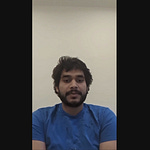Haven’t been streaming as much (always on the road) so I’m goign to mix the Community Spotlights in with the other posts to make sure we can still give everyone the shoutouts.
The livestream is a reupload. I accidentally had the video scheduled to release before I could add the other aspects. My apologies for the double email.
Community Spotlight: Squoosh
A senior engineer and product manager from Google are building an AI agent platform to help e-commerce websites optimize their sites, boosting traffic and revenue. We’re early-stage, backed by top investors, and hiring talented engineers, to join our team.
If you’re excited about AI’s potential in e-commerce, computer use agents, or fine tuning LLMs email hello@squoosh.ai
If you’re doing interesting work and would like to be featured in the spotlight section, just drop your introduction in the comments/by reaching out to me. There are no rules- you could talk about a paper you’ve written, an interesting project you’ve worked on, some personal challenge you’re working on, ask me to promote your company/product, or anything else you consider important. The goal is to get to know you better, and possibly connect you with interesting people in our chocolate milk cult. No costs/obligations are attached.
Companion Guide — Conversation with Alex Heath
Alex Heath is one of the most respected journalists in Tech right in the world. He’s well known for his exclusive scoops, where he shares breaking news about major developments in the industry before anyone else.
Alex is leaving the Verge to venture out on his own as an independent journalist. This conversation was a great opportunity to understand the current media landscape, how to vet information in a world with so much noise, how to build strong relationships with tech executives/sources, and the future of creator economies. If you found this conversation interesting (or you want AI news before anyone else), would strongly recommend following Alex over here—
Here is a rough outline of the conversation.
00:00–03:00 | The AWS Outage
We opened mid-failure. AWS US-East was down. My own product (Iqidis) had users pinging me nonstop. The outage was a good symbol for the key themes in the whole discussion. Most of AI’s public drama is built on a similar fragility—layers of dependency that look solid until they aren’t. Efficiency breeds dependency, and I think that tradeoff is worth thinking about in more detail than just “few dollars saved”.
Takeaway:
Every layer of the modern economy—compute, communication, media—rests on shared infrastructure. If you assume permanence, you will be blindsided. Build redundancy, diversify your sources, and plan expecting failure.
03:00–06:00 | The SF Absurdity
I joked about learning the “art of twinkiness” at a Substack dinner (from a mutual friend of Alex and mine). Half of San Francisco’s tech world runs on that sort of social theater—part performance, part access ritual. You learn to laugh at it, but you also learn not to underestimate it. Relationships decide what gets built long before the press release.
Takeaway:
The network runs on gossip. Proximity is still the most underpriced asset in tech. Show up in more and more places if you want to build a network. Online brand building is great, but in person is what solidifies relationships.
06:00–13:00 | How to Tell Real News from AI Noise
This part matters most.
I asked Alex how he separates signal from noise in a field that runs on hype. His answer: old-school reporting. Corroborate. Cross-check. Never trust a single source. “Ninety-nine percent of tips are wrong,” he said—and you could hear experience in it, not cynicism.
He explained how much of his credibility comes from showing up. He still goes to every major event, meets executives face to face, and watches how they talk when the cameras are off. Physical presence is the only filter left when the internet floods you with claims.
That logic mirrors good research practice. Verification isn’t a moral stance—it’s a process discipline. Whether you’re debugging code or tracking leaks, you start with skepticism and end with reproducibility.
Takeaway:
Treat hype like a dataset. The first version is almost always wrong. Corroborate before you act. Precision compounds; speed decays.
If you want our masterclass on learning AI, this will help—
13:00–17:00 | The Literacy Gap
Most people covering AI don’t understand what they’re reading. They skim a paper, misunderstand the setup, and treat exploratory work like product-ready tech.
Applied AI is constraint-driven. A solution that looks “better” on paper often fails because it breaks deployment constraints—budget, staff, existing stack, or risk appetite. The smartest teams aren’t chasing purity; they’re balancing trade-offs.
AI coverage ignores that nuance. It reads novelty as inevitability. That’s why every “AGI breakthrough” feels recycled within a week—it’s the same misread repeated with new adjectives.
Takeaway:
Think in constraints, not ideals. Progress in AI isn’t about discovering perfect algorithms—it’s about making flawed ones survive contact with reality.
17:00–21:00 | Leaving The Verge
Alex described leaving The Verge to start Sources.news. He had autonomy inside the institution but wanted ownership outside it. Still syndicates with Vox, still connected, but the core is his.
He called it “jumping while you still have leverage.” That’s a rare form of courage—leaving before you have to. Independence isn’t about rejecting safety; it’s about moving before safety turns into stagnation.
21:00–27:00 | The Audience Contract
I’m asking you to go Subscribe to Alex. What do you get out of it? What does Alex promise you?
Alex’s relationship with his readers is grounded in accuracy. People come to him for information that holds up under inspection. We agreed that most media fails because it optimizes for reach before trust.
The next decade will belong to creators who invert that order. When the world feels unstable, people will pay for clarity, not volume. And Alex is one of them.
Takeaway:
Don’t optimize for reach; optimize for credibility density. A smaller audience that believes you will outperform a larger one that doesn’t.
27:00–29:00 | How Independence Survives
We shifted to economics. Alex’s model is hybrid: subscriptions for predictability, advertising for reach. He wants his work accessible without burning out on free labor.
I told him the principle applies to any independent project—have a stable, compounding income stream and another that can spike when opportunity hits. Dependence on a single source is just another form of employment.
Takeaway:
Balance your revenue barbell. Stability plus scalability beats purity. Dependence on a single source—patrons, ads, or subs—is just another form of employment.
29:00–33:00 | Tools and the Attribution Economy
His workflow is straightforward—ChatGPT, Claude, Notion, Granola. “Half brilliant, half useless,” he said. Fair summary of AI today.
What interested me more was his mention of a startup building an MCP (Model Context Protocol) network for journalists. Each article would be tokenized and licensed directly to model providers, creating a pay-per-token system for high-quality training data.
It’s the first plausible model for how writers and analysts could get compensated when AI uses their work. Instead of fighting scraping, formalize the transaction. The internet began as an attention economy; it’s becoming a data economy.
Takeaway:
Track where your data goes. The next wave of value in media and AI will flow through provenance and attribution, not platform traffic.
33:00–36:00 | Reliability Over Intelligence
When he asked what I’m watching, I told him reliability is the next frontier. GPT-5 doesn’t feel smarter; it feels steadier. That’s the upgrade that matters.
There’s ongoing research into non-determinism—getting models to produce consistent reasoning chains instead of drifting with each run. If solved, it could let AI systems iterate on thought the way compilers iterate on code.
I also mentioned the quiet revolutions in quantum error correction and manufacturing AI—fields where small percentage gains create trillion-dollar effects. The most interesting work in AI right now isn’t visible on social media. It’s buried in labs optimizing yield rates.
Takeaway:
Chase reliability before capability. Predictable mediocrity is more useful than impressive randomness.
36:00–End | Copyright, Data, and how to break into Tech
We closed with copyright. Both of us agreed: AI companies will pay for data before long, not out of ethics but efficiency. Lawsuits are costly; licensing is clean. Make the compliant option cheaper, and the problem solves itself—just like Netflix did with piracy.
Given how much I like to end with practical tips, I ended with a note on networking. If you want to break into AI in San Francisco, sometimes what it takes is a hand job in a jacuzzi.
Subscribe to support AI Made Simple and help us deliver more quality information to you-
Flexible pricing available—pay what matches your budget here.
Thank you for being here, and I hope you have a wonderful day.
Dev <3
If you liked this article and wish to share it, please refer to the following guidelines.
That is it for this piece. I appreciate your time. As always, if you’re interested in working with me or checking out my other work, my links will be at the end of this email/post. And if you found value in this write-up, I would appreciate you sharing it with more people. It is word-of-mouth referrals like yours that help me grow. The best way to share testimonials is to share articles and tag me in your post so I can see/share it.
Reach out to me
Use the links below to check out my other content, learn more about tutoring, reach out to me about projects, or just to say hi.
Small Snippets about Tech, AI and Machine Learning over here
AI Newsletter- https://artificialintelligencemadesimple.substack.com/
My grandma’s favorite Tech Newsletter- https://codinginterviewsmadesimple.substack.com/
My (imaginary) sister’s favorite MLOps Podcast-
Check out my other articles on Medium. :
https://machine-learning-made-simple.medium.com/
My YouTube: https://www.youtube.com/@ChocolateMilkCultLeader/
Reach out to me on LinkedIn. Let’s connect: https://www.linkedin.com/in/devansh-devansh-516004168/
My Instagram: https://www.instagram.com/iseethings404/
My Twitter: https://twitter.com/Machine01776819












